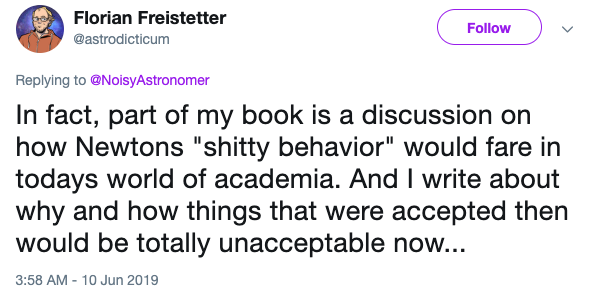
As a physics professor, it’s my main job to teach my students to think about forces and fields, solve engineering problems, and understand what an image of a black hole can tell us about the nature of spacetime. As a professor at a liberal arts college, I also think it’s important to talk about science as a uniquely human endeavor that can’t be quantified and categorized neatly on graph paper. Naturally, that leads me to have some opinions on how we talk about scientists and their legacies.
Yesterday, I shared a book cover on Twitter that had me particularly irked. The book is called Isaac Newton, The Asshole Who Reinvented the Universe. I would have been amused and delighted by such a title about 15 years ago, but I wasn’t having any of that now. When I clicked through to read the publisher’s description, I wasn’t much happier. It ends with:
While documenting all of these unusual traits, the author makes a convincing case that Newton would have never revolutionized physics if he hadn’t been just such an obnoxious person. This is a fascinating character study of an astounding genius and–if truth be told–an almighty asshole as well.
Isaac Newton’s asshole-ish-ness is nothing new to me, nor is his brilliance. Though students in introductory physics courses may find his calculus-based mechanics tedious, the Principia really was revolutionary, introducing a new type of mathematics and connecting the motions of the heavens with the every day motions of our lives. Stories of Newton’s acerbic personality were also peppered throughout my undergraduate physics education, in particular his bitter feud with Gottfried Leibniz about who invented calculus. Though few of Newton’s personal writings survive, descriptions of him by contemporaries have led may to believe that he was kind of a jerk.
As an undergraduate physics major, I was taken by the idea of the “brilliant jerk” who could revolutionize science. To be completely honest, I was a bit of a jerk myself. Despite being in a program that was 50% women (a rarity still), I already had the idea in my head that I had to project being a little full of myself, willing to “go against the grain” no matter who it bothered, and comfortable being “one of the guys.” I’m pretty sure I made even the guys in my program uncomfortable.
In many ways, I was lucky. I didn’t face any serious sexual harassment from my colleagues and mentors, and little gendered harassment. Though, if I did, I bet I used my asshole exterior to deflect it. As my career progressed, however, the microaggressions (and occasional macroaggression) chipped away at that exterior, and I drew into myself. I spent, nay, wasted a lot of time dealing with mounting insecurities that even a job as a tenure-track professor haven’t erased. In some ways, I may have that in common with Newton, who has been characterized as “deeply insecure.” Perhaps being an unrelenting asshole was his exterior shell.
Today, I’m trying to make up for my asshole youth. So many junior scientists are speaking out about the sexual harassment, gendered harassment, and general bullying that they’ve experienced at the hands of colleagues and advisors. The fact that people are being treated poorly is awful in its own right, but on top of that, science is losing brilliant minds that could be revolutionizing our understanding of the Universe. Science today is a lot different from the science of Newton’s time. Projects are bigger, experiments are MASSIVE, and hundreds of scientists are needed to work together to do something as amazing as, say, produce an image of a black hole. The human cost of harassment and bullying is too high, and so is the scientific cost.
So, back to my little Twitter rant. I expressed my dismay at the celebration of assholes in science at the very moment when so many scientists are trying to make the field more inclusive and less full of assholes. After all, one shouldn’t have to have an exterior shell like an armadillo just to “survive” in science.
The fun thing about Twitter is that you never know who is reading. I got a really great response from the author, addressing my concerns exactly!

Unfortunately, the blurb from the publisher didn’t show any of that. So, not only can’t you judge a book by its cover, you can’t entirely judge it by a blurb, either. Hey, maybe a little bit of that asshole is in me still.
So, this is not a judgement of the book itself since I haven’t read it. And to be honest, my to-read pile is already out of control according to my Goodreads profile. However, you can read a review of the book by one of my favorite Astroguyz, David Dickinson.
But I won’t be celebrating the persona of the “brilliant jerk scientist” ever again. My asshole shield can stay in the closet, at least until it’s useful for defending against the assholes of today. Maybe that shield can help pave the way for the scientists coming after me to be their messy, insecure selves with space to be kind to themselves and their colleagues.
I’ve got to say a quick thanks to my colleague who started off this whole discussion on Facebook, the author for kindly replying to my criticism, and to Rebecca for encouraging me to post this!





I have a copy of that book on my desk! I haven’t gotten to it yet, though, because if the book doesn’t have a spider on the cover, it gets a lower priority right now.
Am I missing something on that twitter thread that makes you think this is a great response?
It seems like the author’s response to a complaint about “the author makes a convincing case that Newton would have never revolutionized physics if he hadn’t been just such an obnoxious person” is to follow up with something like “And I also showed why today’s academic culture may have made it harder, or impossible, for him to be such an obnoxious person.”
That’s not a great response, that’s a terrible response. It’s extremely hard to read it without seeing an implicit finish like “Which means that the attitudes of today’s world of academia would have lost us Newton’s achievements, and may be actively stifling many other potential discoveries and large scientific advancement.” .
Maybe the book makes the case differently, showing the advantages of trying to prevent people in academia from being assholes, but that twitt certainly doesn’t state that, and doesn’t present any opinion or value judgement to counter the publisher’s description.
They way I read that comment, it seemed to say that he DID address how being an asshole was detrimental and shouldn’t be tolerated today. But honestly, I can’t tell if the author actually does that without reading the book. (And, usually when someone disagrees with me on Twitter it’s full of vitriol so maybe I was also delighted that his wasn’t!)
I’ve received comments from people who did read the book that have differing views on how well the author actually did just that. ¯\_(?)_/¯
Differing views… Differing from Yarondav or differing from each other?
I haven’t read the book (actually, never heard of it before reading this post) but I also wasn’t sure what the tweet meant. Is the author saying “In the olden days, horrible things were done all the time but we are much better than that now and everything is perfect” or is he saying “as awful as things can be now, they used to be much much worse. We can make things better, have made things better, and should continue trying to do so”? I think Yarondav took it the first way, and so did I.
Being obnoxious can be protective and comforting for someone who is insecure, but I don’t think it helps them achieve anything, at least not in a position that doesn’t require you to browbeat other people into doing what you want (and even then it is not, in my experience, the most effective way of being a “leader”.) However, Newton’s accomplishments didn’t in any way, depend on getting other people to dig holes or carry heavy objects, or even, like Hubble’s or NASA’s “computers”, do calculations for him*. Who knows how many productive discussions never happened and opportunities were lost because Newton was feuding with someone or was off in a snit?
Hey, Buzz!
Differing from each other I think. Or at least some folks really enjoyed it and others did not, all folks that I’m pretty sure agree that things aren’t perfect now and we need to work to improve them.
You’re right, it could be taken as “well things are fine now!” but that would be incorrect cuz they ain’t. I think I took it as the second interpretation you mentioned.. Hey, call me optimistic :-)
Fraser Cain tweeted at me that HE got from the book basically what you describe in your second paragraph, that Newton lost out on collab opportunities for being, as you say, “off in a snit.” (I love that term.)
My feeling as I read more interpretations of Newton’s behavior is that it indeed hid a massive insecurity, which actually makes me feel really bad for the guy.
I created an account just to post this.
It’s amazing how publishers still want to sensationalize everything. Thankfully the author corrected your misconception about the book. I’ll put this on my list of books for my kids to read in a few years, when they’re old enough for it to be more appropriate.